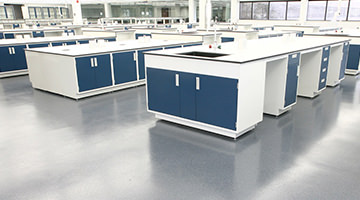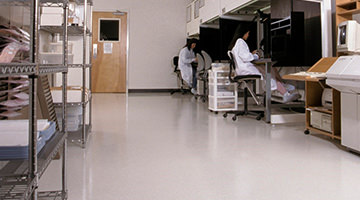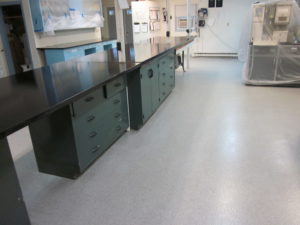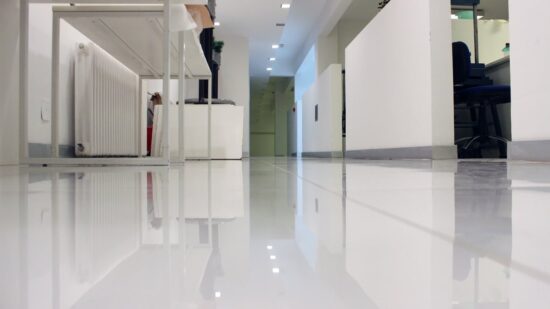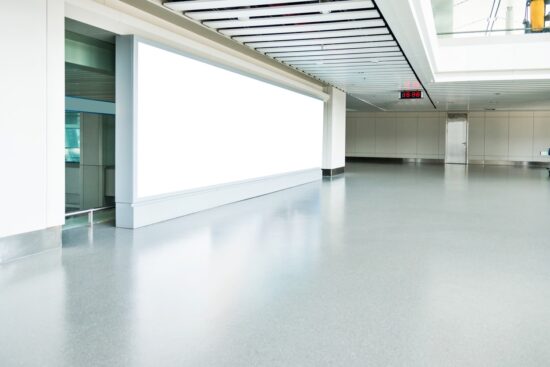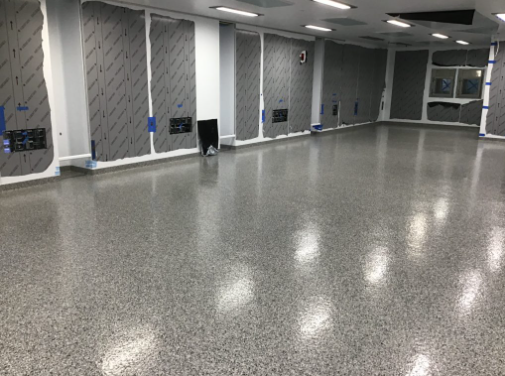Advantages of Epoxy Laboratory Flooring
Durability: Epoxy laboratory flooring is known for its exceptional durability. It can withstand heavy foot traffic, equipment, and chemicals without showing signs of wear and tear. This makes it a suitable choice for high-traffic areas in laboratories.
Chemical resistance: Epoxy flooring is highly resistant to a wide range of chemicals, including acids, solvents, and aggressive cleaning agents. This chemical resistance prevents the flooring from getting damaged or stained, ensuring a long-lasting and visually appealing laboratory environment.
Easy maintenance: Epoxy flooring is easy to clean and maintain, making it a practical choice for laboratory settings. Its smooth and seamless surface allows for easy removal of spills, stains, and contaminants, reducing the risk of cross-contamination and maintaining a hygienic environment.
Safety: Epoxy laboratory flooring offers enhanced safety features. It can be customized with anti-slip additives to improve traction and prevent accidents, especially in areas prone to wet or oily conditions. Additionally, epoxy flooring is fire-resistant, reducing the risk of fire hazards in laboratories.
Aesthetics: Epoxy flooring is available in a wide range of colors, patterns, and finishes, allowing laboratories to create a visually appealing and professional environment. This versatility in design options enables customization to match the laboratory’s branding or specific requirements.
Seamless and hygienic: The seamless nature of epoxy flooring eliminates joints, cracks, and crevices where dirt, bacteria, and other contaminants can accumulate. This promotes a clean and hygienic laboratory environment, reducing the risk of contamination and facilitating easy sterilization protocols.
Cost-effective: Epoxy laboratory flooring offers long-term cost savings. Its durability minimizes the need for frequent repairs or replacement, reducing maintenance costs. Additionally, its resistance to chemicals and easy cleaning properties contribute to a longer lifespan, making epoxy flooring a cost-effective investment.
Environmental-friendly: Epoxy flooring is a sustainable choice for laboratories. It can be installed over existing concrete floors, eliminating the need for new materials and reducing waste. Epoxy coatings are also low in volatile organic compounds (VOCs), making them environmentally friendly and safe for laboratory personnel.
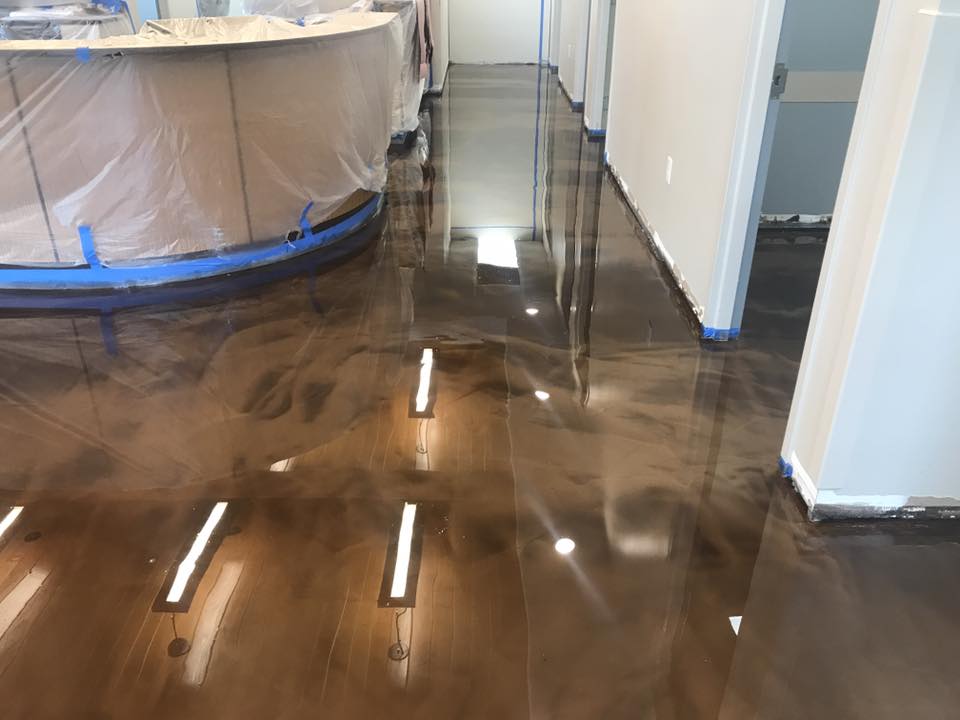
Choosing the Right Epoxy Flooring System for Your Laboratory
When it comes to choosing the right epoxy flooring system for your laboratory, there are several factors that need to be considered. The flooring in a laboratory plays a crucial role in maintaining a safe and functional working environment. Here are some key points to keep in mind when selecting an epoxy flooring system for your laboratory:
Chemical Resistance: Laboratories often deal with a wide range of chemicals, including acids, solvents, and reagents. It is important to choose an epoxy flooring system that has excellent chemical resistance to ensure that it can withstand exposure to these substances without deteriorating or becoming damaged. Look for epoxy flooring systems that are specifically designed to handle the chemicals commonly used in your laboratory.
Durability: The flooring in a laboratory is subjected to heavy foot traffic, equipment movement, and occasional impacts from dropped objects. Therefore, it is essential to select an epoxy flooring system that is durable and can withstand these demanding conditions. Consider epoxy flooring systems that are known for their high compressive strength and impact resistance.
Safety: Safety is of utmost importance in a laboratory setting. Slip and fall accidents can lead to serious injuries and even damage to sensitive equipment. Choose an epoxy flooring system that provides a high level of slip resistance to minimize the risk of accidents. Additionally, consider an epoxy flooring system with anti-static properties to prevent the build-up of static electricity, which can be harmful to sensitive electronic equipment.
Hygiene: Laboratories require a clean and hygienic environment to prevent cross-contamination and maintain the integrity of experiments and research. Select an epoxy flooring system that is easy to clean and maintain. Look for systems that have a smooth, seamless surface, as this reduces the risk of bacteria and other contaminants accumulating in cracks and crevices.
Customization: Every laboratory has different needs and requirements. Choose an epoxy flooring system that can be customized to meet your specific needs. This includes selecting the appropriate color and finish, as well as any additional features you may require, such as chemical-resistant cove bases or line striping for designated work areas.
Maintenance Tips for Epoxy Laboratory Flooring
Epoxy laboratory flooring is a popular choice in scientific and research facilities due to its durability, chemical resistance, and easy maintenance. To ensure the longevity and effectiveness of your epoxy laboratory flooring, it is important to follow some maintenance tips. Here are some key tips to keep in mind:
Regular Cleaning: Regular cleaning is essential to maintain the cleanliness and appearance of epoxy laboratory flooring. Sweep the floor daily to remove dirt, dust, and debris. Use a soft-bristle broom or a dust mop to avoid scratching the surface. For more thorough cleaning, use a mild detergent mixed with water and mop the floor, ensuring that the solution does not sit on the floor for an extended period.
Immediate Spill Cleanup: Accidental spills are common in laboratory settings. It is crucial to clean up spills immediately to prevent any damage to the epoxy flooring. Use an absorbent material such as paper towels or a clean cloth to blot the spill. Avoid using abrasive cleaners or scrubbing vigorously, as this can damage the epoxy coating. If necessary, use a mild cleaning solution to remove any residue left by the spill.
Avoid Harsh Chemicals: While epoxy flooring is highly resistant to chemicals, it is essential to avoid using harsh chemicals or solvents for routine cleaning. These chemicals can deteriorate the epoxy coating over time. Instead, opt for mild cleaning agents that are specifically formulated for use on epoxy floors. Always read the manufacturer’s instructions before using any cleaning products.
Protect from Heavy Objects: Epoxy laboratory flooring is durable, but it can still be damaged by heavy objects. Avoid dragging or dropping heavy equipment or tools directly onto the floor. Use protective mats or pads under heavy equipment to distribute the weight and prevent any impact damage. Regularly inspect the floor for any signs of wear or damage and address them promptly.
Prevent Scratches: Although epoxy flooring is highly resistant to scratches, it is still advisable to take preventive measures to minimize any potential damage. Avoid using sharp or abrasive tools directly on the floor. Place felt pads on the bottom of furniture legs to prevent scratches when moving or rearranging them. Regularly sweep the floor to remove any small particles that could cause scratching.
Safety Considerations for Epoxy Laboratory Flooring
Slip Resistance:
Epoxy laboratory flooring can be susceptible to slips and falls, especially when wet or contaminated. To ensure safety, it is essential to consider slip resistance when selecting an epoxy coating. Look for epoxy flooring options that have a textured or non-slip surface to minimize the risk of accidents.
Chemical Resistance:
Laboratory environments often involve the use of various chemicals, which can potentially damage the epoxy flooring. It is crucial to choose an epoxy coating that exhibits high chemical resistance to withstand exposure to acids, solvents, and other hazardous substances commonly found in laboratories. This will prevent the flooring from deteriorating and maintain a safe working environment.
Fire Resistance:
Fire safety is a critical consideration in laboratory settings. Opt for epoxy flooring that has fire-resistant properties, such as being self-extinguishing or having a high fire rating. This will help prevent the spread of flames in case of a fire, giving occupants more time to evacuate safely.
Durability and Impact Resistance:
Laboratories are often high-traffic areas with heavy equipment and machinery. Epoxy flooring should be durable enough to withstand the constant usage and impact of dropped objects. Choosing a high-quality epoxy coating with excellent impact resistance will minimize the risk of accidents and maintain a safe environment.
Hygiene and Cleanliness:
Maintaining a clean and hygienic laboratory is crucial for the safety of personnel and the integrity of experiments. Epoxy flooring should be easy to clean and resistant to staining, preventing the accumulation of bacteria or other contaminants. Consider epoxy coatings with antimicrobial properties to further enhance hygiene in the laboratory.
Electrical Conductivity:
In certain laboratory settings, electrical conductivity of the flooring may be required to prevent the buildup of static electricity. It is important to assess whether the epoxy coating provides the necessary electrical conductivity to ensure the safety of sensitive equipment and personnel.
Proper Installation:
Lastly, proper installation of epoxy laboratory flooring is essential for ensuring safety. Improper installation can lead to uneven surfaces, delamination, or other issues that may pose a safety risk. It is recommended to hire experienced professionals or contractors with expertise in epoxy flooring installation to ensure a high-quality and safe installation process.
University Lab Environment – DUREX – Seamless Floor u0026 Wall Systems
How to Choose the Right Science Lab Flooring Black Bear
Different Laboratory Flooring Types Explained: Vinyl, Resin and More
Different Laboratory Flooring Types Explained: Vinyl, Resin and More
Price Intel: How Much Does a Commercial Epoxy Floor Cost?
Laboratory Epoxy Coating, Fusion Bonded Epoxy Coatings, epoxy
Durable Flooring for Life Science u0026 Pharmaceutical Facilities
Related Posts:
